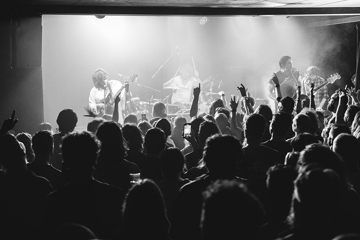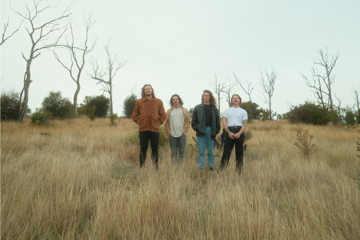Psych Submersion
“We felt that after (third album) Phosphene Dream we had brought in influences that really appealed to us, and we wanted to push that further, but also integrate it with our past to make something fairly seamless."

There are few bands in current rotation that can effectively state that they are the driving force behind an entire genre of music.
Texan psych rock band The Black Angels fit such a classification, however. Since forming in 2004, the band have forged forward at the tip of the post-millennial psychedelic movement, having crafted four lauded albums (including this year's Indigo Meadow), toured the world countless times, pinned down festival stages while also starting their own, and launching their own label The Reverberation Appreciation Society. The now four-piece (Nate Ryan having left the band in the early stages of the writing and recording of Indigo Meadow) may not have brought psychedelia into rock but they have successfully brought it kicking and screaming into the 21st century.
“Hey, we are not the forefathers of anything,” Black Angels' frontman Alex Maas laughs. “There are bands that we are massive fans of – The Warlocks, Brian Jonestown Massacre, Black Rebel Motorcycle Club – who were doing this before we had a mind to. We just play music that we really like, which is influenced by bands like Silver Apples or 13th Floor Elevators who were ahead of their time because they had clearly defined who they were almost from the outset. Psychedelic is such a broad term. I just think The Black Angels is a strong creative force for us, and it pulls other bands towards us. It's fairly intuitive; not every band we see as peers has an overt political message, or is hallucinogenic, or has drone elements to their sound. There's a tone that exists that we all admire and gravitate towards, and it's great to be seen to be a part of something that moves and captures people the way psychedelic music does.”
After venturing away from Texas to record 2010's Phosphene Dream (the bulk of it was done in Los Angeles with acclaimed producer Dave Sardy), the band came closer to home for the new album, venturing out into the west Texas desert, a move Maas attests lent some urgency and gravity to the recordings.
Don't miss a beat with our FREE daily newsletter
“We recorded at this studio called Sonic Ranch with John Congleton (Explosions In The Sky, Clinic, Disappears), and there's nothing to do but let the music wash over you,” he offers. “The studio is basically in this border town between Texas and Juarez, and there is nothing around – no distractions. We became submerged in the sounds, without competition from outside, and I think it helped these songs to really come alive.”
There is more lightness on Indigo Meadow than was hinted at on Phosphene Dream, held in both the brevity of the tracks and the instrumentation that takes place. Yet Indigo Meadow remains intrinsically a Black Angels album – Maas' iconic incantations hover over a driving musical force, Christian Bland's guitar a searing brand, Stephanie Bailey's metronomic drums propelling forth like an unstoppable colossus.
“Indigo Meadow is us trying to evolve,” Maas states. “We felt that after (third album) Phosphene Dream we had brought in influences that really appealed to us, and we wanted to push that further, but also integrate it with our past to make something fairly seamless. We've shifted from recording these really long songs, because to be honest a lot of the great psychedelic songs of the '60s and '70s weren't long anyway, they were short songs that had a clear definition and could be expanded on or shortened as the mood came. I don't think we could ever not sound like us, like The Black Angels; we have a structure and an understanding that was there from when we started and a way of playing that we like. There are still dark elements in there – I think we are incapable of breaking away from that. We have such different tastes that come in from different directions, and we want them all to have a voice somewhere – but The Black Angels' sound is never in question.”
The prominence of the organ in The Black Angels dynamic is even more prominent on the new album, a factor that Maas is particularly excited about.
“I've become more and more interested in the capabilities of the organ,” he admits. “I've collected a few over the years, and the tones from one to the next open up new sounds and possibilities. We use vintage instruments when recording because it lends a warmer sound that we relate to, that speaks to us. Recording with older instruments comes from knowing what we want; we looked at bands like Love and the sound that they achieved, this full on, rich sound. There are so many bands now that we really love that are recording in the lo-fi way, which I think is really cool, it can lend a sort of immediacy, even an authenticity to what you're doing. But for us we look at bands from the '50s and '60s that were creating timeless sounds, timeless pop songs, all under three minutes, and that is inspiring to us.”
The end result is a coup of sorts, with Indigo Meadow managing to capture the past, present and future of what has become an era-defining sound.
“We wrote about thirty songs before we went in to record; we took a lot of time at the beginning of 2012 to just focus on us,” Maas explains. “We sat down with John and we spoke about how we wanted to proceed and move forward, and it was incredibly difficult and draining but also very rewarding. Cutting thirty songs down to seventeen is like pulling teeth, or killing your children. But it had to be done. It was the first time where we knew what we wanted from an album, and we recorded, in and out, and everything was clear from the start.”
The true Black Angels experience though is in the live arena. where the band have excelled in extrapolating their songs into a motorik trance of raw repetition and power. With Ryan having left the band, Maas maintains that they have taken a leaner approach to their sets, which in some way has made it more aggressive in scope.
“We will be touring with another guitarist, but after Nate left we kind of looked at re-prioritising,” Maas muses. “The live aspect for us is the most important element, it's why you play music in the first place. It becomes a full on experience. We have a light show which becomes a member in and of itself, done by a close friend of ours Bob Mustachio. For psych music to work you have to be a part of it; you have to believe in it. There is a distinct difference between those who are psych and those who are merely playing at it. You end up on the outside if it isn't real, if it's an affectation or a stylistic choice, rather than a necessity. You should be able to disappear in the music, no matter where it takes you.”







